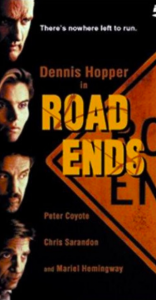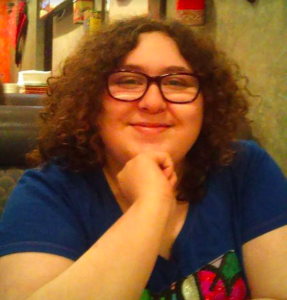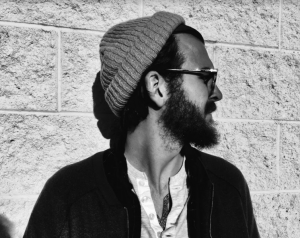
Mar 30, 2018 | Feature |
By Nathan McIvor Contributing Writer
Assistant Professor of Creative Writing William Mesce is the author of two dozen screenplays and a former corporate writer at HBO. His industry experienc

Mesce wrote the screenplay for Road Ends, a 1997 crime film starring Denis Hopper. (Photo courtesy of IMDB)
e serves him well in teaching a craft that, for better or worse, exists as an industrial product in mainstream Hollywood.
In conveying the difficulties of the profession to students, Mesce describes the screenplay as “a tool for somebody else, not an end … it’s a document to be used by one-hundred fifty other people.”
Tinseltown can be a tough on aspiring screenwriters, something Mesce learned as young man when he submitted a screenplay to a contest held by Brian De Palma, director of Scarface and The Untouchables. The rules promised that the winner’s work would be used for De Palma’s next feature film. Mesce received a meager check for winning and no further response.
When De Palma’s next film Blow Out was released years later, Mesce noticed two lines of dialogue he had written in the film. Mesce had been duped into doing uncredited work on a film “Written and Directed by Brian De Palma.”
Despite this rude awakening to the screenwriter’s trade, Mesce dedicated himself to the craft. Mesce likes to impart resilience to his students because they deserve to know the reality of the trade before moving to Los Angeles. The 1997 film Road Ends, a crime thriller starring Dennis Hopper and Mariel Hemingway, remains Mesce’s best known work.
After leaving HBO in 2009, Mesce found his love for teaching when a friend from graduate school asked him to teach a class at a local New Jersey college. Mesce says there is “no greater buzz than being in a classroom when it’s clicking.”
A metropolitan man, teaching at a campus like UMF was uncharted territory for him when he joined UMF in Sept. 2017. “This one is the smallest schools I have taught at,” Mesce said. “It gives you the opportunity to have the same student several times. A professor can watch them grow over the years and develop a bond. That could never happen in any of the other places I’ve taught at. I had the same number of students in my high school class as the entire student body here!”
Mesce also noted the easy going demeanor typical of a small Maine town, saying “people are nicer and I find that the students have a different frame of reference from what I am used to. So far, I’ve never had a writing student who couldn’t write.”
Mesce found his love for movies growing up in Newark, New Jersey, where he spent his summer afternoons at the local movie theaters. Mesce credits Chinatown as his generation’s genre film, and prefers films that have “a sense of place” and lists Sam Peckinpah and Sidney Lumet as his favorite directors.
Mesce most recent book, The Rules of Screenwriting and Why You Should Break Them was published by McFarland in 2017.
Mar 30, 2018 | Feature |
By Jane Metsker Contributing Writer
Next semester, for the first time, UMF will be offering an Afro-Brazilian musical martial arts class called Capoeira. The class incorporates history and dance as well as martial arts and will be instructed by Professor Chelsea Fairbank.
Fairbank has always had an interest in music, culture, and history. She first saw Capoeira being played in a park and became fascinated with it. At nineteen, Fairbank moved to Hawaii and was able to find classes there with an instructor from the “motherland” of Capoeira, Bahia Brazil.
“I was very lucky to train with him and have some very close lineage,” said Fairbank. “It’s similar to martial arts where there’s a lineage of teachers, what they call mestre [meaning master] in Portuguese.” Fairbank trained with her mestre for a few years before relocating to Brazil to study full time and learn Portuguese.
According to Fairbank, Capoeira incorporates history, music and community. Historically it has been disguised as a dance and described as a “fight dance.” It has been criticized for being different from traditional forms of martial arts, however, Fairbank said she absolutely believes it could improve anyone’s confidence and ability to protect themselves.
“If somebody was looking for a more straightforward self defense, protection oriented, I think it can fulfill those but it’s not the primary mission of training in Capoeira,” she said.
Tekia Cox, a Junior Anthropology Major, stated in an email interview that she’s looking forward to taking a class that’s both fun and could be useful for developing self defense skills.
“I hope to be able to protect myself and also an anthropological look at that type of defense,” Cox said. “Even if UMF prides itself on being safe it’s important for everyone to learn self defense.”
Fairbank explained that Capoeira is a form of physical and mental training that develops “cunning of an awareness around you and a confidence towards self protection.” Fairbank noted that there’s an ongoing debate about the differences between Capoeira versus more traditionalized martial arts, self defense, that we would think of in the west. She also stated that the class is very inclusive and proactively welcomes all genders.
Senior Psychology major Emily Beard is interested in the course because she has previous experience with martial arts and interested in furthering her education on the subject.
“I took Taekwondo for years and I recognize that this is a very different style of martial arts but I would like to get back into it.”
Beard has some previous knowledge of Capoeira and explained it’s a very defensive art. “It’s good for preventing harm without causing it, it teaches you to block attacks but you won’t learn much about instigating attacks.”
Fairbank said Capoeira has been historically used as a means of escaping oppression and using cunning to facilitate that. “It’s a large symbol for liberation.” She explained that it was a way of training under the gaze of your oppressor so that they don’t know what you’re doing. “It represents empowerment and community in a huge way, it represents inclusion.”
The text included in the course will be an ethnographic text call The Ring of Liberation, however the course is open to anyone with an interest in any component of the course. Fairbank said anthropology students might have an especially keen interest in the course because of its background, but could be intriguing to anyone.
“It is a really unique and special place to explore your own limits but also expand beyond them and have an openness and willingness to do that kind of work,” Fairbank said. “Capoeira presents the the opportunity to do that in a really playful and community based and really joyous kind of way.”
Any students feeling intimidated by the idea of taking the course can be assured it’s an open and inclusive environment for students of any skill level. “If there’s any intimidation about approaching the course, remember that in Portuguese it’s called playing Capoeira, not fighting Capoeira, and I that captures a real sense of how playful the growth that you can achieve through Capoeira is.”

Mar 30, 2018 | Feature |
By Willy Doehring Contributing Writer
UMF students Billie Rose Newby and Gail Bello recently placed second and third respectively in the Terry Plunkett Maine Poetry Festival’s annual Student Poetry Contest, which was open to all University of Maine System students. To celebrate their achievement, Newby and Bello will be reading their poems before the festival’s keynote speaker, poet Sharon Olds, at the University of Maine at Augusta on April 6, 2018.

Third Place winner Gail Bello. (Photo courtesy Gail Bello)
The competition was stiff for students participating in the contest. There were over 90 submissions from across the state, with each student allowed to submit up to three poems. For Newby, a freshman in the Creative Writing program, placing second was as surprising as it was exciting. “I was honestly shocked,” Newby said. “I was really happy, but also never thought that my work was actually good enough.”
Like most Creative Writing majors, Newby learned about the contest through reminders sent to majors by professors Pat O’Donnell and Jeffrey Thomson. At the time, the contest didn’t stand out to Newby, but after seeing that submissions were open to students of any year, she decided to enter.
“It was a spur of the moment, ‘I’m going to be brave and apply for one of these’ kind of thing,” Newby said.
Bello, a junior Creative Writing major, had a similar experience to Newby when it came to entering the contest. Bello had heard about the festival in the past but never entered before. Bello thought to herself, “You know, I’m gonna go for this one,” after seeing the email reminding Creative Writing majors of this year’s contest. Bello was thrilled to be in third place, but like Newby was surprised to see her work recognized. Bello’s poem “had been rejected by different literary magazines in the past, so it was cool to see it finally be given a place.”
The festival will be a first for both Newby and Bello. Both have read their poetry in front of an audience before, but it has always been at smaller events such as student readings in the Landing. “I’ve kind of been not thinking about it in hopes of not getting overly nervous,” Newby said. “I’m sure I’ll be fine right up until the moment I actually get up to read.”
For Bello, dealing with the nerves is a bit easier. “Personally, I’m very blessed that I don’t have a fear of public speaking,” Bello said with a laugh. Still, the festival will be the biggest reading yet for Bello. “It’s not my first time reading my work, but it’s my first time being recognized for it,” she said.
On the day of the festival itself, Newby will read her poem “Contents of Uncle John’s Attic,” a list poem that tells a couple’s tragic story through the items stored in their attic. Bello will read from her poem “When I saw Degas’s Little Dancer of 14 Years,” which refers to Edgar Degas’s famous sculpture of a young dancer while reflecting on Bello’s own time ignoring directions in ballet class.
Mar 30, 2018 | Feature |
By Andrew Devine President
UMF Political clubs such as the College Republicans and College Democrats are preparing events and efforts in anticipation for the November midterm elections.
While 2016 saw the Farmington campus very active in political efforts, fall of this year will see students involved in Congressional and local elections and campaigns.
According to Ballotpedia, a nation-wide election information website, in Farmington and Maine, items on the ballot will include: U.S. Senate, U.S. House, Governor, State Senate, State House, and other state executives.
Patrick Fallon, president and chair of the UMF College Republicans (CRs), discussed the activities of the club this semester in an interview. As of this month, the CRs have had visits from Mary Mayhew and Shawn Moody, gubernatorial candidates, hosted the Field Director for the 2nd Congressional District from the Maine GOP various times, and attended the Conservative Political Action Conference in Washington, D.C. where they saw the President speak.
The College Democrats also have several upcoming events including an event hosting all four candidates for the 2nd Maine Congressional District on campus to campaign for their nomination and to debate pertinent issues in current political discourse.
Jeff Willey, President of the College Democrats, wrote in an email interview, “One of my favorite events this year has been Jared Golden visiting our club to discuss his campaign and what he wishes to do should he win the election.” Willey went on to write, “It personally feels as though I am making an important contribution to the future of this country and is stellar being directly involved.”
The CRs do not have any definite plans at this time for events in preparation for the election, but anticipate being busy in the fall. Willey stated that the College Democrats plan on doing voting registration drives to get as many young people here at UMF actively involved in the political process. Neither club will endorse any candidates prior to the Primaries leading up to the election. After that point, Fallon stated that the CRs would support any nominees held by the Maine GOP.
Willey concluded in stating, “I would love our club to be involved in the upcoming elections, and I am certain our members will be, myself included. However, what I am more focused on is simply informing the University student body about the candidates who they will be choosing between and trying to get as many people involved in the democratic process as we possibly can.”

Mar 30, 2018 | Feature |
By Emilee Eustis Contributing Writer
Zackary Lavoie is a pickleball master, a heavenly singer, the owner of a guinea pig named Gerald, and now a pu-

2017 Graduate Zack Lavoie published his first chapbook in early 2018.(Photo courtesy of Zack Lavoie
blished writer. The UMF graduate is making waves in the business of poetry writing with his recently released chapbook Upheavals.
Though Lavoie majored in English, his interest has always been in poetry. “I find a lot of beauty in the brevity of [poetry],” said Lavoie. “It forces one to read intensely, and I think that is a great thing.”
Today, Lavoie works as an English as a Foreign Language (EFL) Specialist Editor for a global platform and edits documents for those whose language is not primarily English. But when Lavoie is not editing, he is feverishly working on his poetry.
During Lavoie’s time at UMF, he was awarded with the Alice James Books Director’s Chair Fellowship, which gave the benefits of working one-on-one with publishers to strengthen his skills. Like many successful writers, Lavoie’s publication did not come without struggles.
“Grammar plays a different sort of role in the book. Capitalization, spacing, and even spelling all shift and wobble, and letting that happen is difficult,” Lavoie said, “Sort of like holding the leash of an angry, out of control, ten-thousand-pound dog.”
Through his journey, Lavoie has made many connections to remind him that the struggles are worth the outcome. “I’ve been lucky enough to meet some really wonderful poets, editors, and other incredibly influential folks while writing Upheavals,” said Lavoie. After two years of meeting and greeting, long editing processes, and publication work, Lavoie’s chapbook Upheavals has made it to print – but his work does not end there.
Lavoie has much to celebrate, but he understands that work cannot always be perfect. Lavoie quickly learned that it is easy to become “to

Zack Lavoie’s chapbook, “Upheavals.” (Photo courtesy of Zack Lavoie)
o poetic” and let a poem become bigger than it should.
“It’s important to remember to be observant, and sometimes that means narrowing your focus to little moments,” Lavoie said. But Lavoie also realizes the boundaries that poetry can challenge, and said, “It’s our jobs as poets to translate it.”
Lavoie has poems online and in print in Empty Mirror Magazine, OCCULUM Journal and Dirty Paws Poetry Review, with his next piece waiting to be published in the Longleaf Review. As for more books, Lavoie said he has a manuscript for a full length that is being worked on, but it is “still in infancy.”
On April 12th, Lavoie will be attending a reading at the Farmington Public Library with Jeffrey Thomson, a UMF poet and professor, and another UMF grad, Audrey Gidman.
Copies of Lavoie’s chapbook can be purchased online at Amazon, online and in-stores at Barnes & Noble, at the Farmington Public Library, and on his website zackarylavoie.com.




